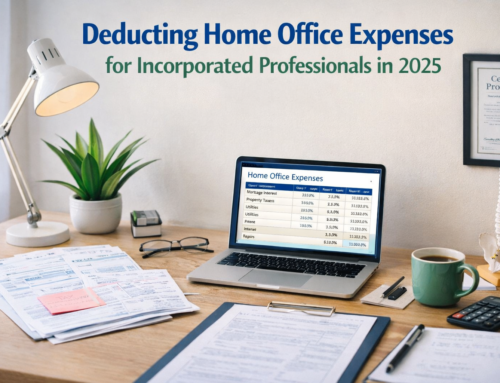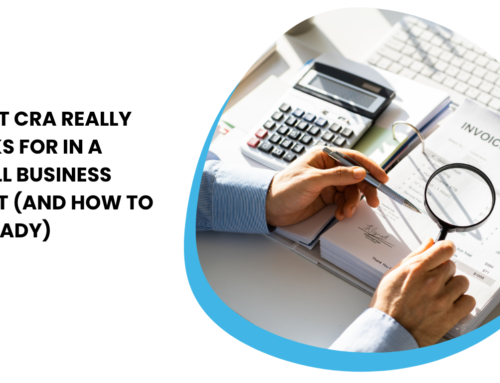Should I Incorporate? – What’s Right for Your Business
When starting or growing a business in Canada, one of the most important decisions you’ll make is how to structure it. Should you stay a sole proprietor or incorporate your business?
Each option has pros and cons depending on your income level, growth plans, risk tolerance, and long-term goals. Let’s break down the key differences to help you make the right choice for your situation.
What is a Sole Proprietorship?
A sole proprietorship is the simplest form of business structure. You and your business are one legal entity. That means:
- You report business income on your personal tax return (on a business schedule called the T2125)
- You are personally liable for all business debts and obligations
- There are fewer administrative requirements and setup costs
Good for: Freelancers, consultants, side hustlers, and early-stage entrepreneurs.
What is Incorporation?
Incorporation creates a separate legal entity—a corporation—that is distinct from you personally. This means:
- The business files its own tax return (called a corporate tax return)
- You become a shareholder and/or employee
- You have limited liability protection (your personal assets are usually protected) *
*Chat with a lawyer for more details on liability protections offered.
Key Differences: Sole Proprietor vs. Incorporated
| Feature | Sole Proprietor | Incorporated Business |
| Legal Status | You and your business are the same | Separate legal entity |
| Tax Filing | Reported on your personal T1 return | Separate corporate T2 return, with timing based on the company’s chosen tax year end date |
| Tax Rates | Personal tax rates (up to 53% depending on province) | Lower corporate rate (as low as 11% in some provinces) |
| Income Splitting | Not allowed | Can split income via dividends (if structured properly and some restrictions may apply) |
| Liability | Unlimited personal liability | Limited liability (with exceptions) |
| Startup/Compliance Costs | Minimal | Higher setup and ongoing filing costs |
| Credibility | Basic | Often seen as more professional/trustworthy |
When Should You Incorporate?
While incorporating can seem appealing, it’s not always the right move immediately. You should consider incorporation when:
✅ Your profits exceed your living expenses
If your business makes more money than you personally need to withdraw, incorporation lets you leave profits in the company at a lower tax rate and potentially defer personal taxes.
✅ You want to limit personal liability
If your business carries risk (employees, contracts, product liability), incorporation helps protect your personal assets.
✅ You want to raise money or bring in partners or grow significantly
Incorporation provides flexibility to issue shares, add investors, and separate ownership from management.
It also allows you to use lower rate tax dollars to grow your company rather than pulling out at higher personal tax rates then re-investing to cover payroll increases etc.
✅ You want to pay yourself in tax-efficient ways
With a corporation, you can choose between salary and dividends—or use a combination for tax optimization and RRSP/CPP planning. You can also be more pro-active in planning when your personal income is recognized.
When Should You Stay a Sole Proprietor?
✅ You’re just getting started
If you’re testing a business idea or making part-time income, staying as a sole proprietor keeps things simple and cost-effective.
✅ Your income is relatively low
If you need all the profits personally (e.g., to pay bills), there’s little tax advantage to Incorporating—since you’ll be taxed on it either way.
✅ You want to avoid extra paperwork
Corporate taxes, minute books, separate bank accounts, and legal filings can be complex. For smaller businesses, the admin burden may not be worth it.
How Much Does Incorporating Cost?
- Self-incorporation: Federal incorporation: $200 (online) OR provincial incorporation: varies (~$100–$500 depending on province)
- Incorporation by a lawyer: ~$500–$2,000 depending on complexity
- Annual maintenance – legal: $50-$250
- Tax filings and year end financials: +$1,750 depending on complexity/size
Tip: If you’re incorporating for tax deferral, you’ll need to leave some money in the company—so plan accordingly.
Still Not Sure? Here’s the Bottom Line:
- Start as a sole proprietor if you’re earning modest income, just getting started, or want low-cost simplicity.
- Consider incorporation when you’re making steady profits, want tax flexibility, or need legal protection. This can be done in an efficient tax manner by filing what is called a Section 85 election when you ready to incorporate. Talk to an accounting professional as this requires specialized advice and additional filings.
Every situation is different, and the right choice depends on your goals, income level, and risk appetite.
Need Help Making the Right Choice?
At Virtual Heights Accounting, we specialize in helping Canadian entrepreneurs make confident, strategic business decisions. Whether you’re launching your first side hustle or scaling to six figures, we can guide you on the best structure for your unique goals.
➡️ Book a free discovery call to chat with a CPA who gets small business.
At Virtual Heights Accounting, we specialize in helping small businesses succeed. Whether you’re just starting or scaling your business, we’re here to make sure your financial side runs as smoothly as it can.





